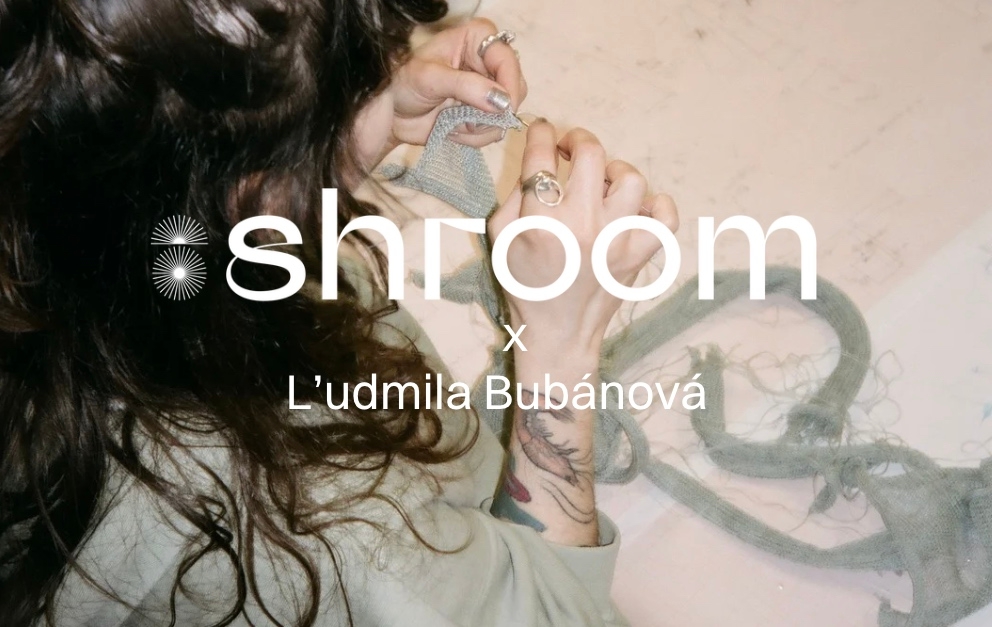Ludmila Bubanova
doesn’t go on vacation.
Instead of resting, she chooses her studio, where knitting becomes a form of meditation, therapy, and emotional expression. In conversation with Kamila Knap, she talks about the power of daily practice, bodily inspirations, culturally rooted shame, and why an artist’s life constantly teeters between freedom and uncertainty.

Interview:
Kamila Knap, Shroom: Before I turned on the recorder, you said you don’t go on vacation because you find it boring.
Ludmila Bubanova: Yeah, I can’t imagine leaving my studio for more than two days. I always regret the time I’m not working. It’s not workaholism – it’s just that I feel best in my studio. Spending time alone is both relaxing and fulfilling.
So a true passion.
Recently on a date, I was telling someone how much time I spend in the studio. They asked me what I do to relax. I was surprised by my own answer: “I go to the studio.” I’m there every weekend – it’s my place.
I was really impressed when we met to talk about our collaboration. You didn’t stop knitting the entire time.
I just can’t stop. Once you really get into it -whether it’s knitting or another practice -you can’t stop.
I think that’s true for anyone who masters their craft. It’s like that with any life practice you decide to fully commit to. I already see you as a true master of textiles.
But the deeper I get, the more I realize how much I don’t know. There’s always something new, something to learn. My work is constant learning. Every day I gain new knowledge and skills, and that’s amazing. I’m now at a stage where I feel a lot intuitively, but I want to learn more complex techniques, including digital and knitting programming. I’d love to learn how to work with advanced machines. I’ve always been fascinated by them, but since I studied at an art academy, not a fashion school, I didn’t have access to them. These machines are rarely available outside commercial or academic environments.
“I just can’t stop”
Well, you could always go back to school – I dream about studying something fulfilling. I studied law, but it was never my passion.
I wasn’t thrilled either, but I think studying at a later age, when you’ve already worked and gained experience, is totally different. You appreciate the opportunity more. I think I wasted my chance during my studies.
Like many of us who went straight to university after high school. At 19, you’re basically a baby, and you’re just excited to feel “adult.”
Exactly – thinking, “I can do what I want now, and no more lectures, Mom.”
We don’t appreciate our professors and mentors enough. Maybe there are mature 18- or 19-year-olds, but I definitely wasn’t one of them.
I was convinced I knew what I wanted. At 19, I thought it was set design and costume design, theater. Only at 30 did I realize that’s not what I wanted, and that my real calling is textiles. It’s all I want to do – nothing else interests me.
How long have you been in Warsaw?
Fourteen years. I came on an Erasmus exchange to the Academy of Fine Arts. I spent one semester here and came back because I fell in love with Warsaw and Poland. I still love it here and feel more at home than in Slovakia. My adult life – everything that shaped me – happened in Warsaw. I decided to apply for a master’s at the academy and got in.
For me, it was the first city I moved to from Bratislava. I lived with my parents during university and wanted independence so badly. As soon as I arrived, I felt it—freedom, a chance to build everything from scratch. And Warsaw stuck. But who knows, maybe someday I’ll live elsewhere. The idea of building a new life in a new place is very tempting.
Not fashion, but memory – clothing as emotional skin
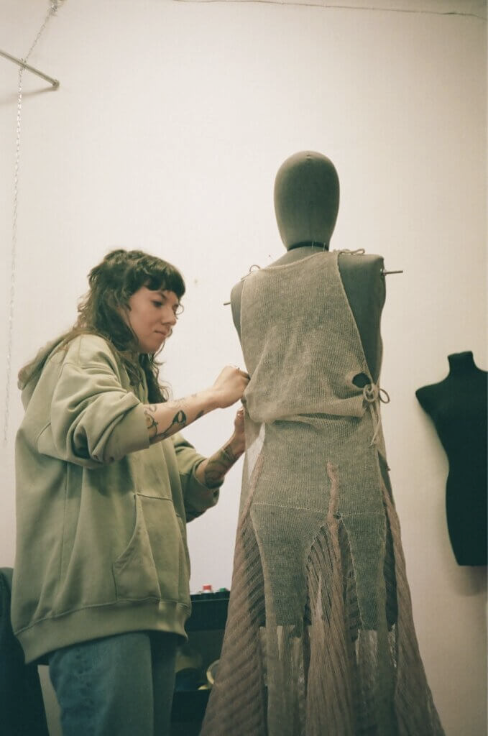
What inspires you?
I think I’m most inspired by clothing itself – but not in the fashion sense. More like in a sentimental, bodily sense. I’m very sentimental. I love family mementos. I’m inspired by inherited items, the ones tied to memories, situations, touch, or relationships. I collect things from my grandmothers, great-grandmothers, my mom, even my own childhood clothes. I think everything I do visually starts from there. Clothing to me is a second skin – not necessarily a form of self-expression, but more like packaging for the body, something that’s in constant contact with it. Textiles are everywhere in daily life – from pillows and sheets to curtains and car upholstery. We’re always surrounded by fabric. We leave traces on it – micro skin particles, creases – and that makes it very bodily and emotional.
I’m also inspired by the body itself – anatomy, structure, organs, everything that’s invisible, internal.
That’s really visible in your forms, and a lot of organic shapes that resemble organs. It resonates with me a lot, especially in light of personal experiences.
Yes, all of this is connected to health, illness, care. Also fear and trying to know oneself, or sometimes avoiding that. I think shame plays a role in this too. There’s a search for self-acceptance – something I experience daily as a woman.
In Catholic or post-Catholic countries, shame is such a strong element in our psyche. There’s been so much shaming around the body, especially women’s bodies and placing them in the realm of the profane. Many of us were raised with the idea that the body is something to be ashamed of, not celebrated. I think our generation is just starting to learn how to be kind to our bodies, how to take care of them.
I think I’m processing that through my work – through material and touch. I feel deeply emotionally attached to the pieces I make. The physical act of making is a kind of meditation for me. Sometimes I experience emotional highs while working – beautiful moments. Honestly, that’s what I do it for.
I see how my pieces stir emotions in others too, and that’s great – a huge added value. But truly, I make them for myself
You can really feel that emotion in your work – and I think that’s why I fell in love with it at first sight.
I think it comes from having a daily practice. Right now, I’m lucky to be doing this full time. I’ve got a grant, so I can work daily. That gives me access to myself during the creative process – time to discover, build, and search.
That’s something really hard to do when you can’t afford to be in your studio every day. I know that from experience. A year ago, I was in a completely different situation. And I could end up back there. I’m a freelance artist with no institutional backing.
I’m always scared that I won’t be able to come to the studio every day and that I’ll have to work for someone else.
The position of someone driven by ideals and creativity rather than pure commercialism is really difficult. Shroom is also a romantically inclined brand. We created our formulas with as much integrity as we could, and that means they’re expensive, and our margins aren’t as high as they could be. That kind of idealism comes with a price — and we’re paying it.
I still take on various side jobs for financial reasons, just to stay afloat. But that’s a choice I made. I’m very grateful to my parents — they’re a huge support and they truly back me. I chose the harder path when I could’ve had a relatively easy one in film set design. My parents supported me during my studies, then I started working in set design, where I earned decent money. And now I’m back to a point where sometimes I have to borrow. But that’s rare — and always comes after a big internal struggle. I feel a responsibility, even an obligation: since I’ve been given this chance, I have to make the most of it and do my absolute best. I’m committed to building my brand and my name.
I try to post regularly on Instagram, to constantly build new connections so that I can keep doing what I love — and also make a living from it. I feel like I have this one shot, and I won’t get another in life. I’m trying to stay resourceful and proactive, not complain, not be lazy, and definitely not say, “Ugh, Instagram is awful, I can’t be bothered, it’s so boring and exhausting.” It’s an important medium in art and culture today, there’s no avoiding it.
Losing on Instagram is like losing at life now. At least if you’re building a brand.
A career in the audiovisual world seems inseparably tied to social media. A third of my day goes into taking photos, creating posts, and replying to people.
Some of artist works
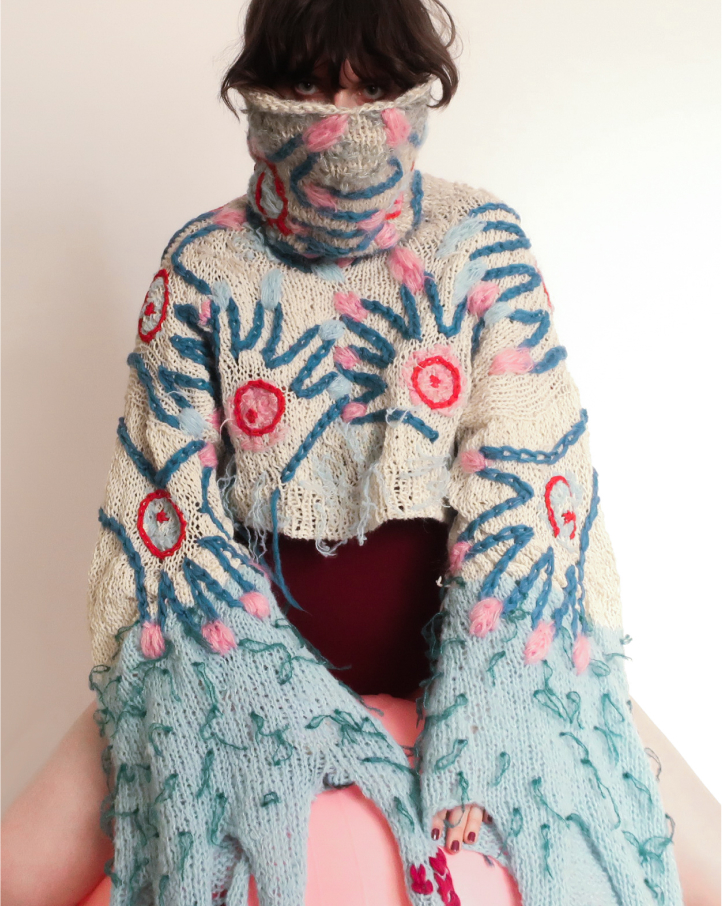
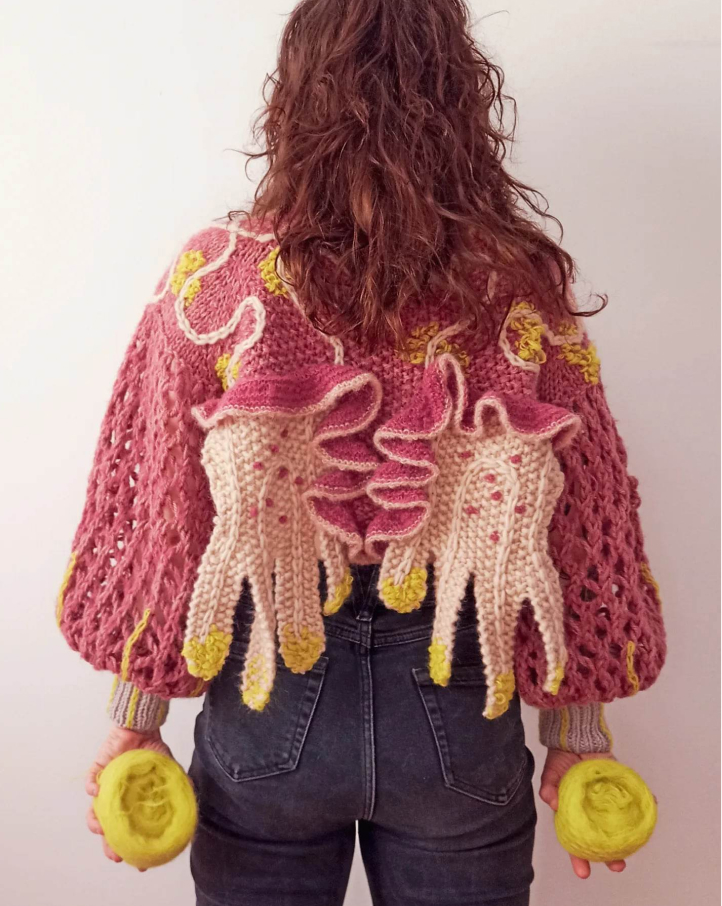
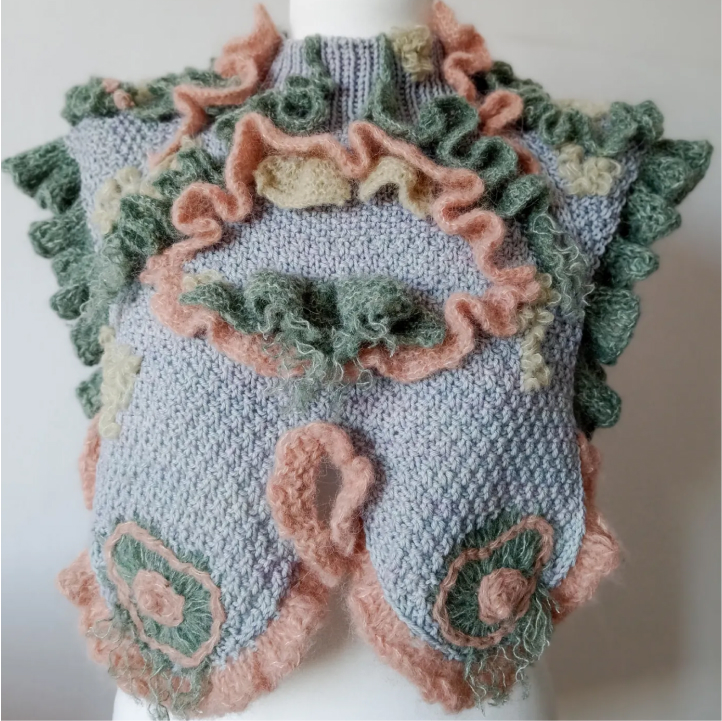
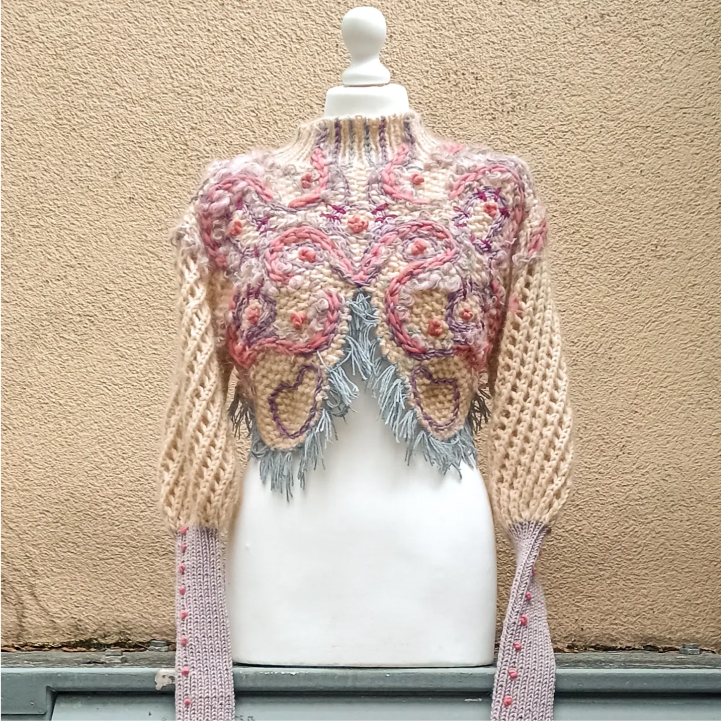
Love, sex and creativity: the path of solitary growth
Czy poza pomocą ze strony rodziców dostałaś jeszcze jakieś wsparc Aside from your parents’ support, did you receive any other help?
I’ve experienced a lot of help and kind gestures since I started putting my work out there. I’ve met so many people who opened doors for me or bought something from me. Turns out that when you offer something personal that moves people emotionally, you often get something back. It’s transactional – but that’s what relationships are.
That emotional level is so important and really requires you to open up. You can be a creator who makes things and hides them in a drawer, afraid to share them. But stepping into the light and showing your vulnerability – that’s where the real courage lies. And it’s exactly what people are looking for.
Dla mnie to też było dużym przełomem. Zawsze byłam bardzo emocjonalnie zamkniętą osobą. Nie zauważałam, tego, co dzieje w mojej psychice albo po prostu to ignorowałam. Miałam też z tego powodu problemy też związku, który ostatecznie się rozpadł. Nie potrafiliśmy znaleźć porozumienia, a ja uciekałam dodatkowo od zrozumienia samej siebie, własnych wątpliwości, które nawarstwiały się latami, aż skończyło się rozstaniem. Myślę, że mogło skończyć się lepiej. Ale przez to wszystko na nowo odkryłam siebie, zaczęłam zajmować się dzierganiem i było to dla mnie coś bardzo uwalniającego i terapeutycznego. Wtedy też zaczęłam wychodzić do świata ze swoją twórczością. Łączyło się to z tym, że trzeba trochę bardzo zrozumieć siebie i być bardziej otwartym też na swoje emocje i swoje przeżywanie.
I remember how last year you said that sex really limits creative energy — and I completely agree.
When I’m deeply in that creative flow, with a specific project in mind, spending the whole day in the studio, sex is the last thing I think about. All of that energy goes straight into my work.
I was deeply in love when Shroom was just taking its first steps on the market. On one hand, it was a beautiful feeling, but it also takes over your mind.
Now I’m single, and even my mom says this is the time I need to make the most of. I’m not tied down by a partner, children, or love — and of course, you never know how long that will last — but right now, it’s the moment when I can grow and find fulfillment in it. It will be wonderful when that changes, because no one wants to be alone in life; it’s good to have a partner and close ones. But at this point, I can devote myself to creating. And that is a beautiful time.
Thanks to working through so much within myself and dedicating myself to creation, I’ve become a more conscious person — more compassionate and empathetic than I was back when I wasn’t doing the things I am doing now.
Interview by: Kamila Knap Photos by: Antoni Golik
Ludmila about herself
I am a Slovak-born artist and designer, currently based in Warsaw. I graduated from the Faculty of Stage Design at the Academy of Fine Arts in Warsaw and from the Department of Stage Design at the Academy of Performing Arts in Bratislava. My work emerges at the intersection of costume, textiles, and fashion. It encompasses wearable art objects, installations, and original clothing. In recent years, I have returned to textiles and fiber as my primary medium — a reconnection that began during lockdown, when I revisited my childhood passions. Since then, I have been consistently developing my practice in textile techniques, which have become my main form of expression. Knitting and knitwear design hold a special place in my work. My primary inspiration is the human body — especially the female body — its strength and fragility in both social and cultural contexts. I have participated in group exhibitions in Poland and Slovakia, and my debut collection was presented on the Fashion Stage at Open’er Festival. I am the author of stage designs for over twenty theater productions, and I also collaborate on film projects (including as a graphic designer in the Oscar-winning The Zone of Interest). My projects have been worn by artists such as Antonina Nowacka, Oskar Karski, OTSOCHODZI, IKARVS, Livka, Sara James, and flutist Ania Karpowicz. In 2025, I received a scholarship from the Polish Ministry of Culture and National Heritage to create a series of objects and costumes inspired by the herstories of Poland’s first female medical students.

